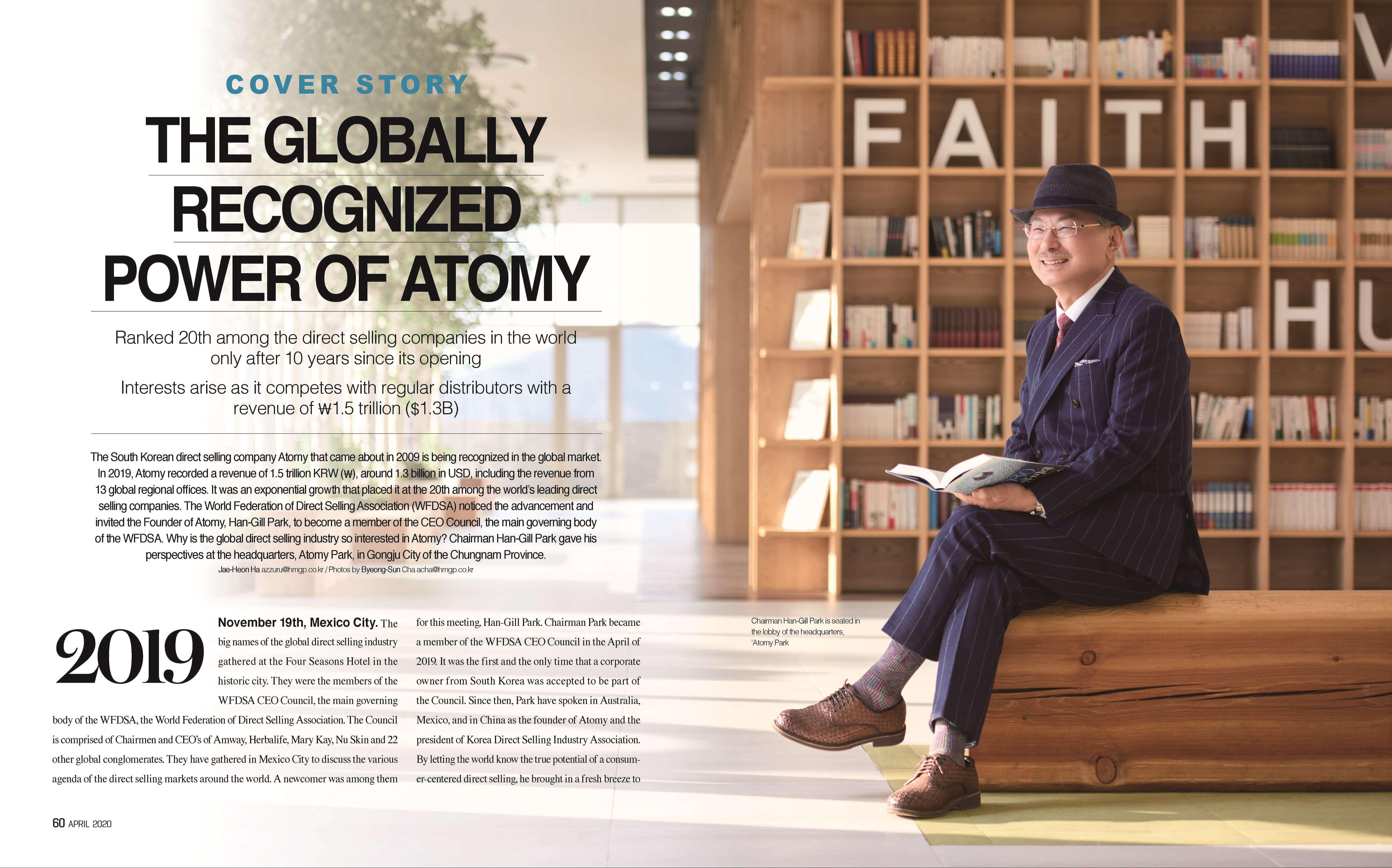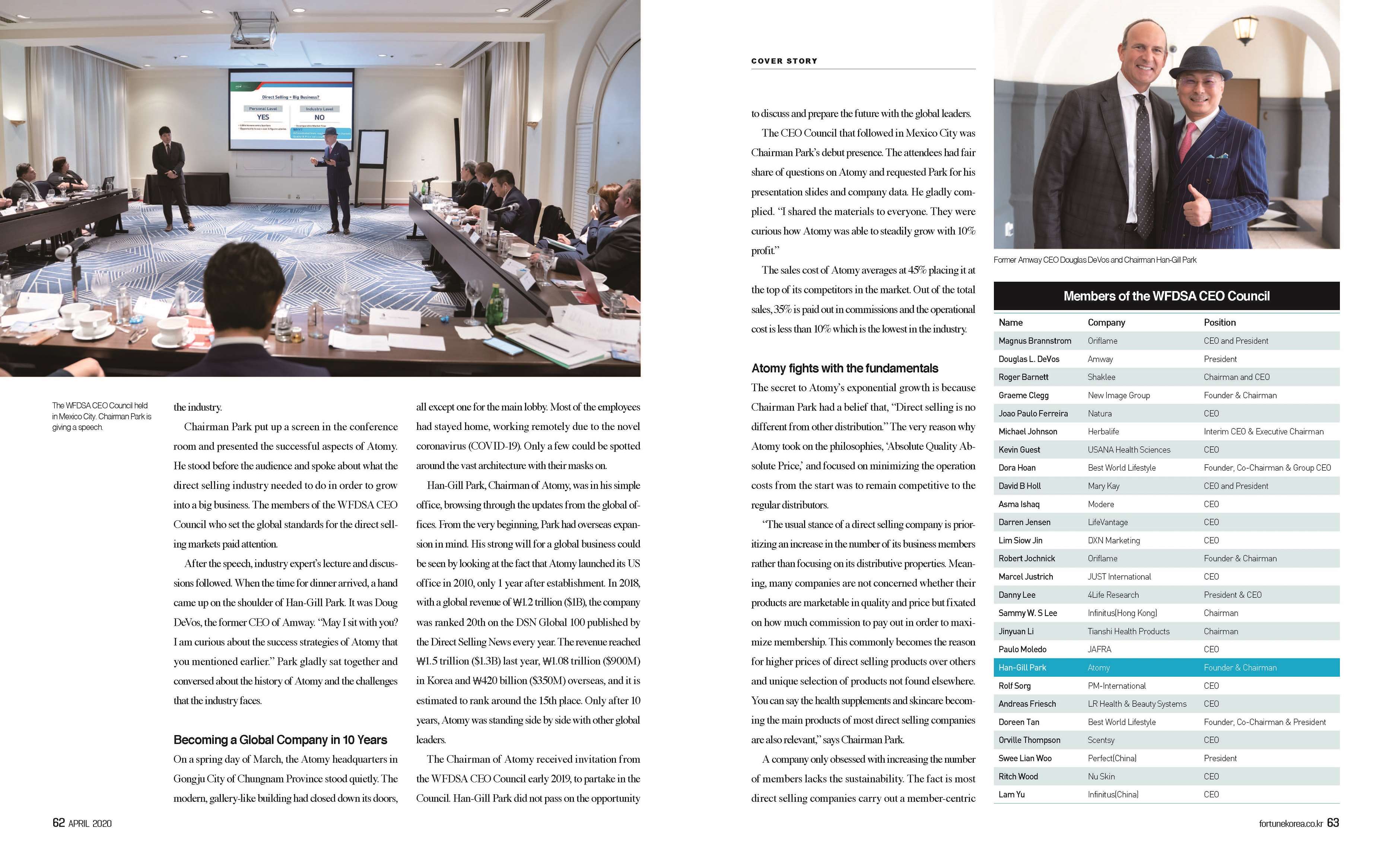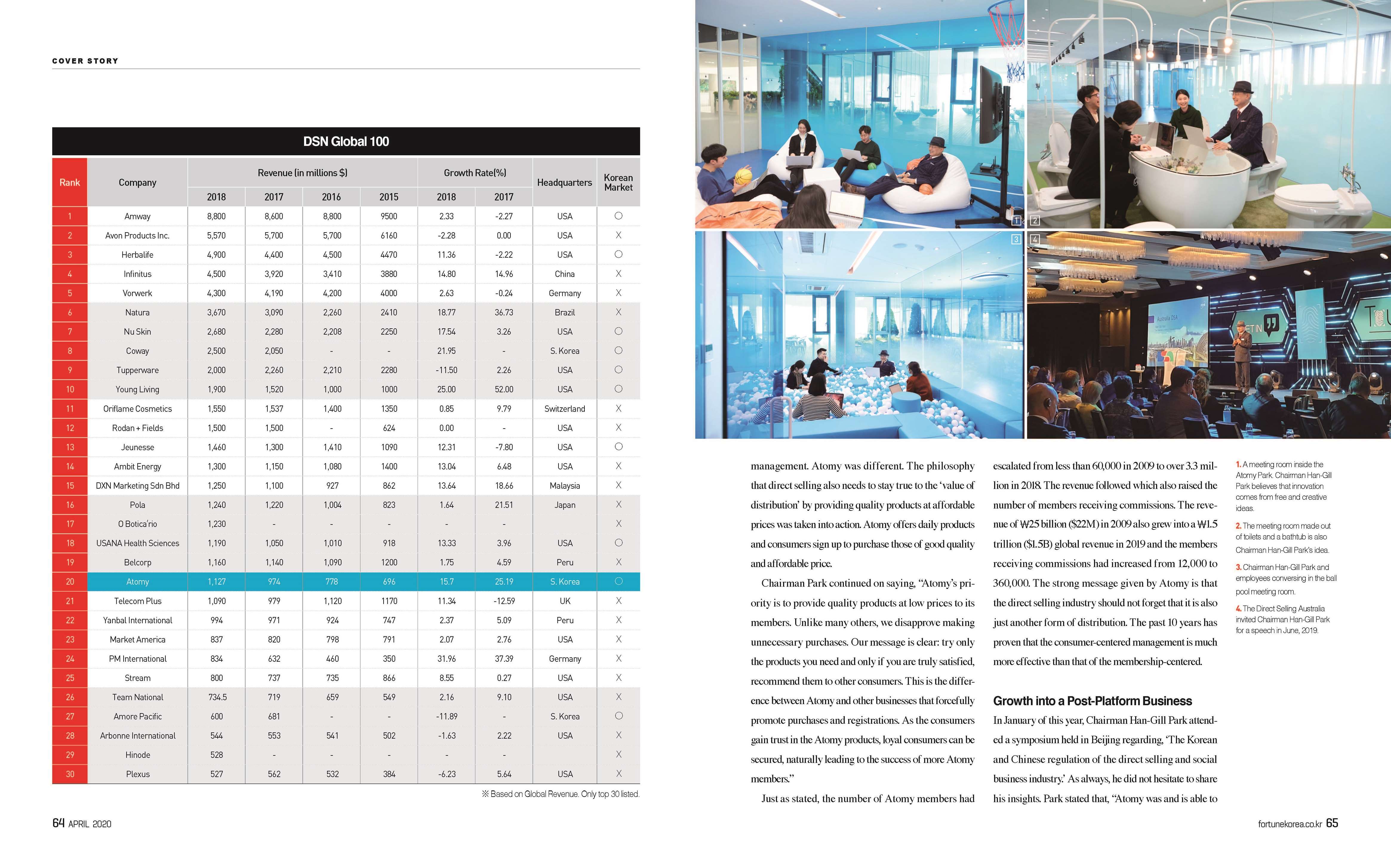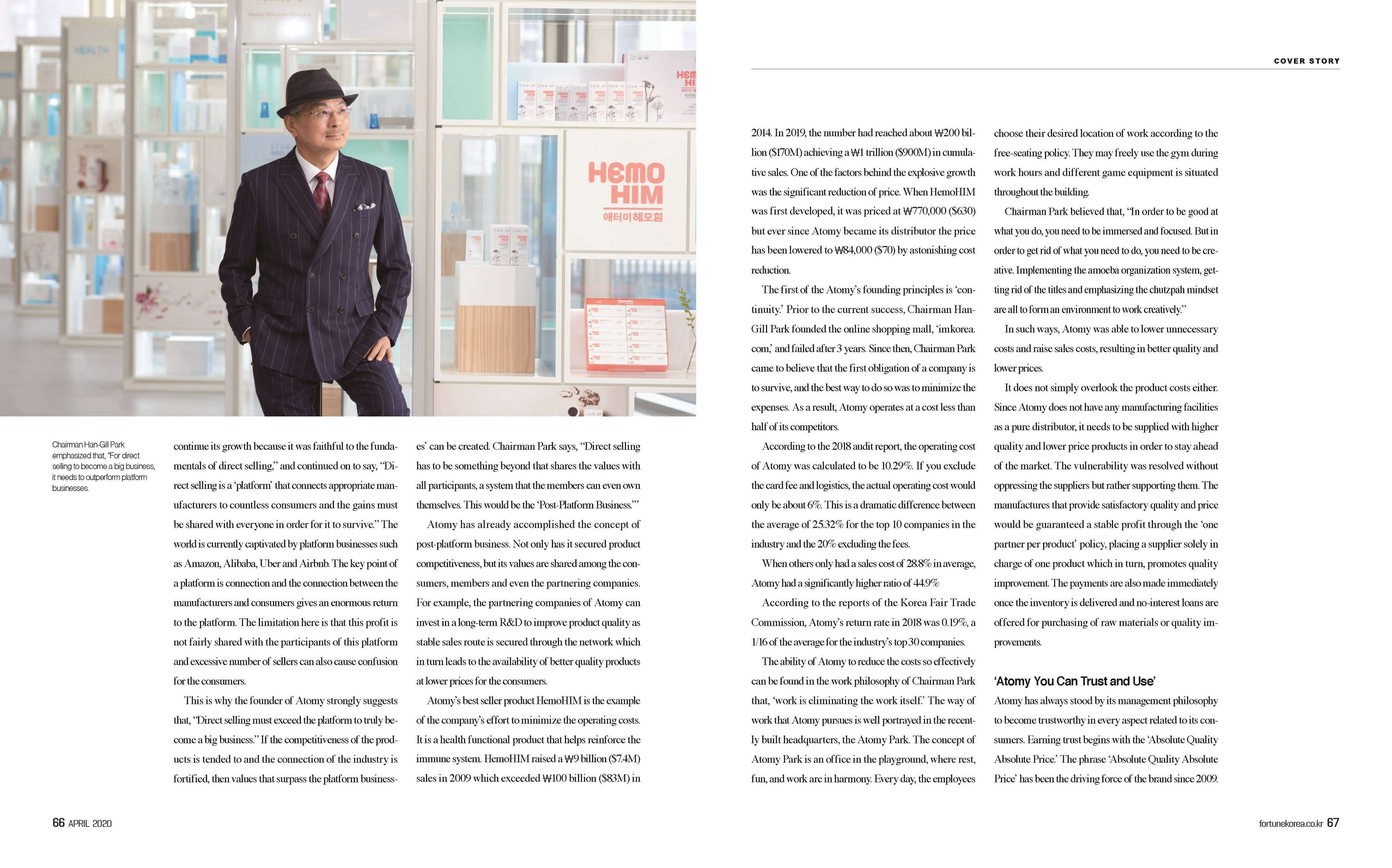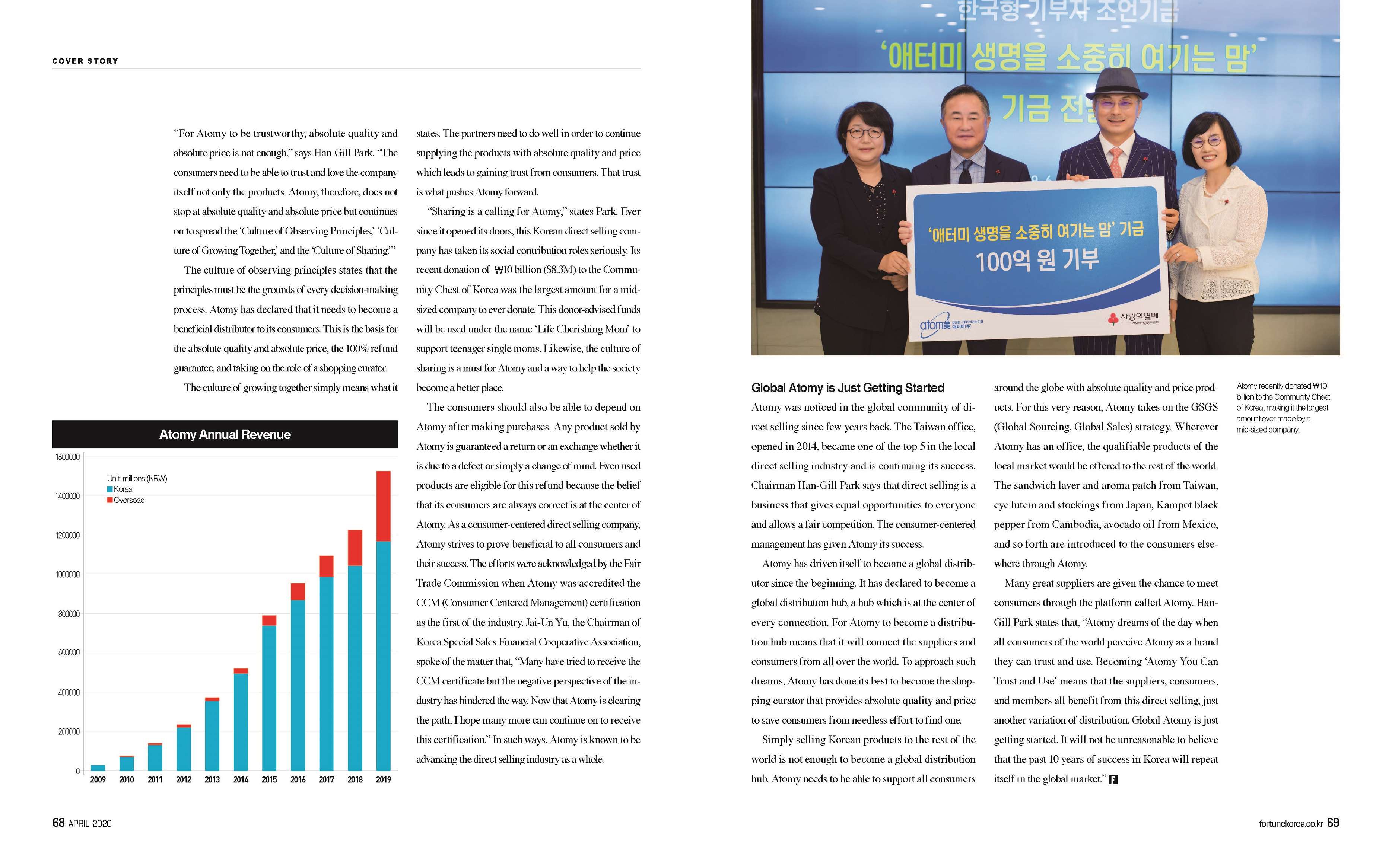ARTICLE The Globally Recognised Power Of Atomy
The Globally Recognised Power Of Atomy
THE GLOBALLY RECOGNIZED POWER OF ATOMY
Ranked 20th among the direct selling companies in the world only after 10 years since its opening
Interests arise as it competes with regular distributors with a revenue of ₩1.5 trillion ($1.3B)
The South Korean direct selling company Atomy that came about in 2009 is being recognized in the global market. In 2019, Atomy recorded a revenue of 1.5 trillion KRW (₩), around 1.3 billion in USD, including the revenue from 13 global regional offices. It was an exponential growth that placed it at the 20th among the world’s leading direct selling companies. The World Federation of Direct Selling Association (WFDSA) noticed the advancement and invited the Founder of Atomy, Han-Gill Park, to become a member of the CEO Council, the main governing body of the WFDSA. Why is the global direct selling industry so interested in Atomy? Chairman Han-Gill Park gave his perspectives at the headquarters, Atomy Park, in Gongju City of the Chungnam Province. Jae-Heon Ha / Photos by Byeong-Sun Cha

Chairman Han-Gill Park is seated in the lobby of the headquarters, 'Atomy Park'
2019 November 19th, Mexico City. The big names of the global direct selling industry gathered at the Four Seasons Hotel in the historic city. They were the members of the WFDSA CEO Council, the main governing ody of the WFDSA, the World Federation of Direct Selling Association. The Council is comprised of Chairmen and CEO’s of Amway, Herbalife, Mary Kay, Nu Skin and 22 other global conglomerates. They have gathered in Mexico City to discuss the various agenda of the direct selling markets around the world. A newcomer was among them for this meeting, Han-Gill Park. Chairman Park became a member of the WFDSA CEO Council in the April of 2019. It was the first and the only time that a corporate owner from South Korea was accepted to be part of the Council. Since then, Park have spoken in Australia, Mexico, and in China as the founder of Atomy and the president of Korea Direct Selling Industry Association. By letting the world know the true potential of a consumer-centered direct selling, he brought in a fresh breeze to the industry.
Chairman Park put up a screen in the conference room and presented the successful aspects of Atomy. He stood before the audience and spoke about what the direct selling industry needed to do in order to grow into a big business. The members of the WFDSA CEO Council who set the global standards for the direct sell-ing markets paid attention.
After the speech, industry expert’s lecture and discus-sions followed. When the time for dinner arrived, a hand came up on the shoulder of Han-Gill Park. It was Doug DeVos, the former CEO of Amway. “May I sit with you? I am curious about the success strategies of Atomy that you mentioned earlier.” Park gladly sat together and conversed about the history of Atomy and the challenges that the industry faces.
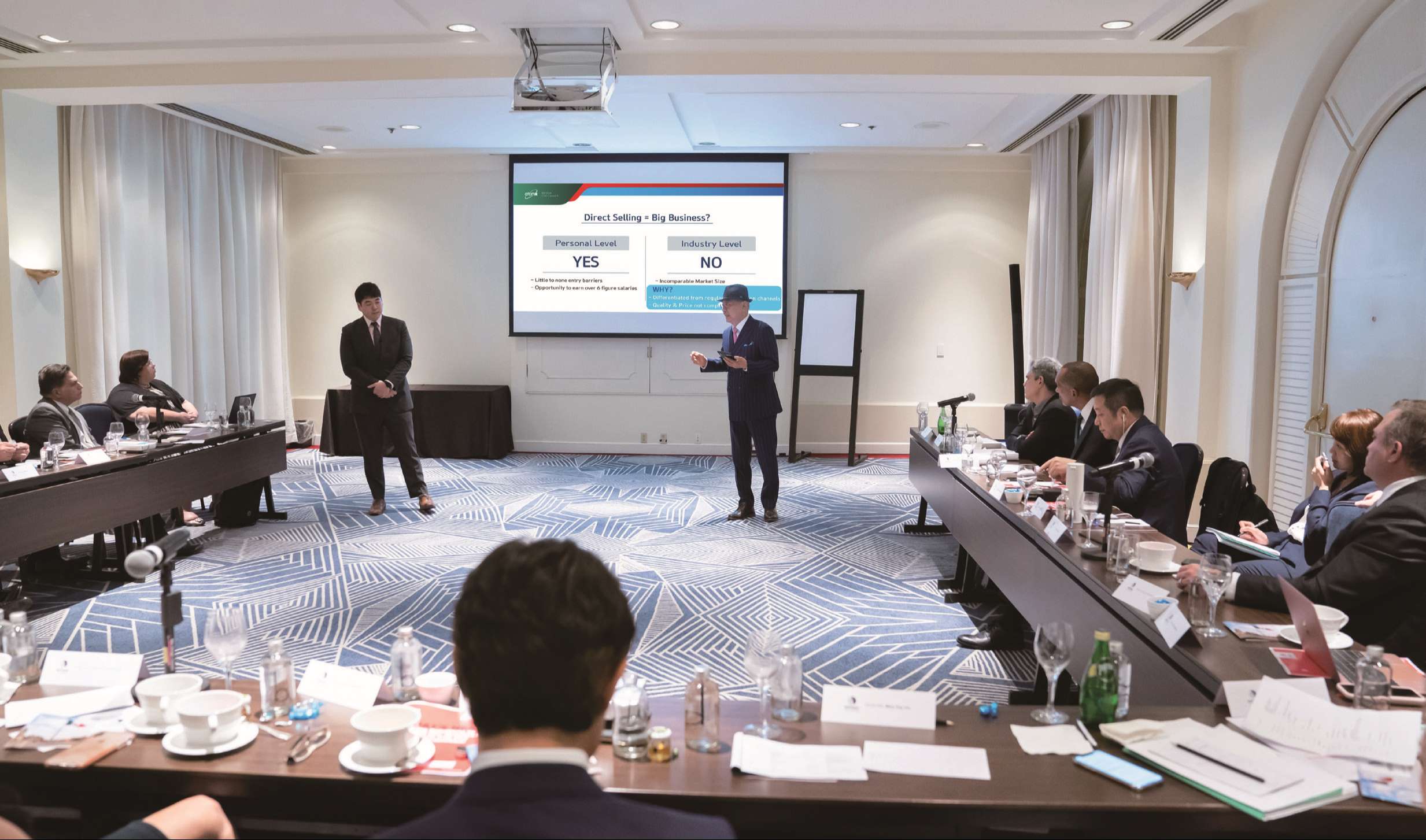
The WFDSA CEO Council held in Mexico City. Chairman Park is giving a speech.
Becoming a Global Company in 10 Years
On a spring day of March, the Atomy headquarters in Gongju City of Chungnam Province stood quietly. The modern, gallery-like building had closed down its doors, all except one for the main lobby. Most of the employees had stayed home, working remotely due to the novel coronavirus (COVID-19). Only a few could be spotted around the vast architecture with their masks on.
Han-Gill Park, Chairman of Atomy, was in his simple office, browsing through the updates from the global offices. From the very beginning, Park had overseas expan-sion in mind. His strong will for a global business could be seen by looking at the fact that Atomy launched its US office in 2010, only 1 year after establishment. In 2018, with a global revenue of ₩1.2 trillion ($1B), the company was ranked 20th on the DSN Global 100 published by the Direct Selling News every year. The revenue reached ₩1.5 trillion ($1.3B) last year, ₩1.08 trillion ($900M) in Korea and ₩420 billion ($350M) overseas, and it is estimated to rank around the 15th place. Only after 10 years, Atomy was standing side by side with other global leaders.
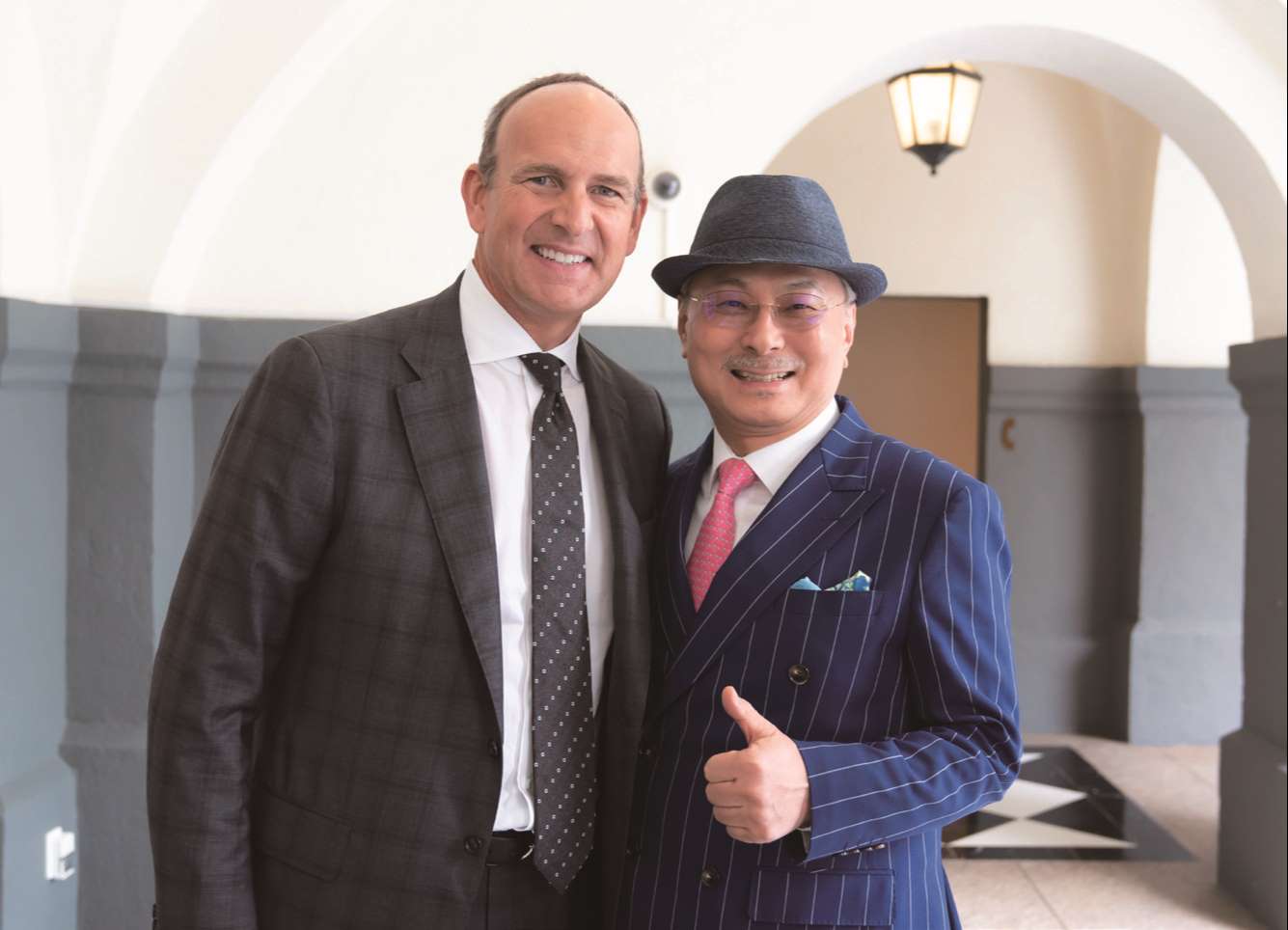
Former Amway CEO Douglas DeVos and Chairman Han-Gill Park
The Chairman of Atomy received invitation from the WFDSA CEO Council early 2019, to partake in the Council. Han-Gill Park did not pass on the opportunity to discuss and prepare the future with the global leaders.
The CEO Council that followed in Mexico City was Chairman Park’s debut presence. The attendees had fair share of questions on Atomy and requested Park for his presentation slides and company data. He gladly complied. “I shared the materials to everyone. They were curious how Atomy was able to steadily grow with 10% profit.”
The sales cost of Atomy averages at 45% placing it at the top of its competitors in the market. Out of the total sales, 35% is paid out in commissions and the operational cost is less than 10% which is the lowest in the industry.
Atomy fights with the fundamentals
The secret to Atomy’s exponential growth is because Chairman Park had a belief that, “Direct selling is no different from other distribution.” The very reason why Atomy took on the philosophies, ‘Absolute Quality Absolute Price,’ and focused on minimizing the operation costs from the start was to remain competitive to the regular distributors.
“The usual stance of a direct selling company is prioritizing an increase in the number of its business members rather than focusing on its distributive properties. Meaning, many companies are not concerned whether their products are marketable in quality and price but fixated on how much commission to pay out in order to maximize membership. This commonly becomes the reason for higher prices of direct selling products over others and unique selection of products not found elsewhere. You can say the health supplements and skincare becoming the main products of most direct selling companies are also relevant,” says Chairman Park.
A company only obsessed with increasing the number of members lacks the sustainability. The fact is most direct selling companies carry out a member-centric management. Atomy was different. The philosophy that direct selling also needs to stay true to the ‘value of distribution’ by providing quality products at affordable prices was taken into action. Atomy offers daily products and consumers sign up to purchase those of good quality and affordable price.
Chairman Park continued on saying, “Atomy’s priority is to provide quality products at low prices to its members. Unlike many others, we disapprove making unnecessary purchases. Our message is clear: try only the products you need and only if you are truly satisfied, recommend them to other consumers. This is the difference between Atomy and other businesses that forcefully promote purchases and registrations. As the consumers gain trust in the Atomy products, loyal consumers can be secured, naturally leading to the success of more Atomy members.”
Just as stated, the number of Atomy members had escalated from less than 60,000 in 2009 to over 3.3 million in 2018. The revenue followed which also raised the number of members receiving commissions. The revenue of ₩25 billion ($22M) in 2009 also grew into a ₩1.5 trillion ($1.5B) global revenue in 2019 and the members receiving commissions had increased from 12,000 to 360,000. The strong message given by Atomy is that the direct selling industry should not forget that it is also just another form of distribution. The past 10 years has proven that the consumer-centered management is much more effective than that of the membership-centered.
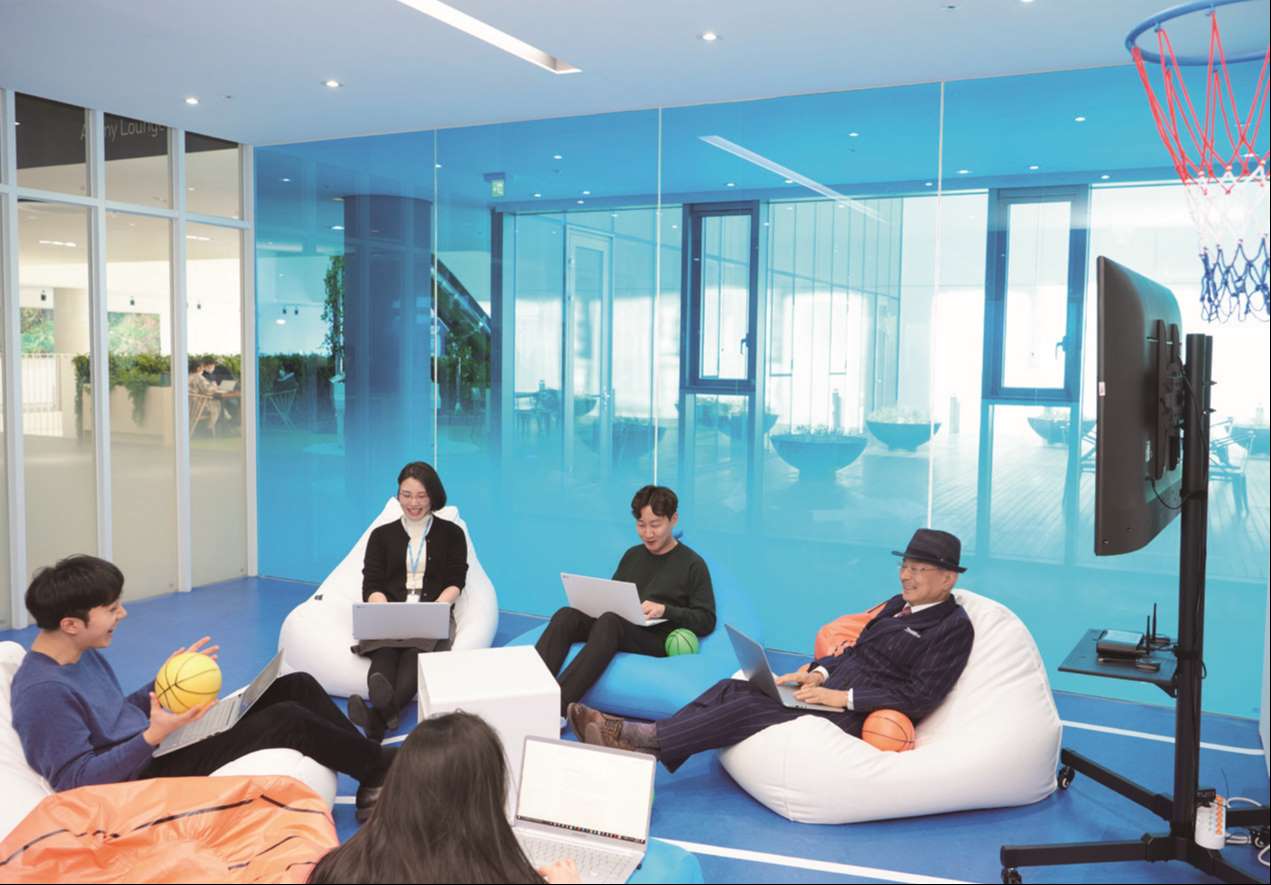
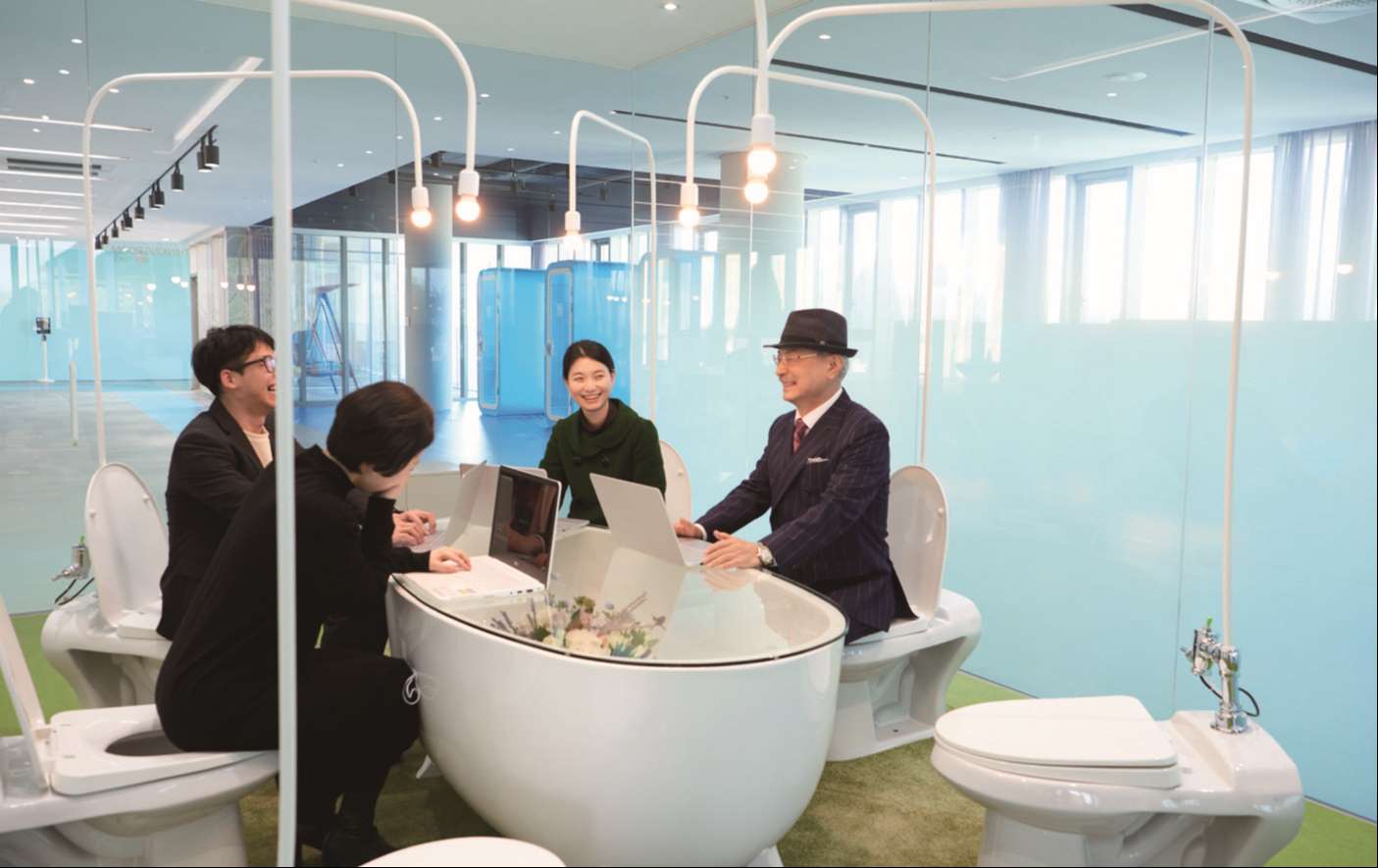
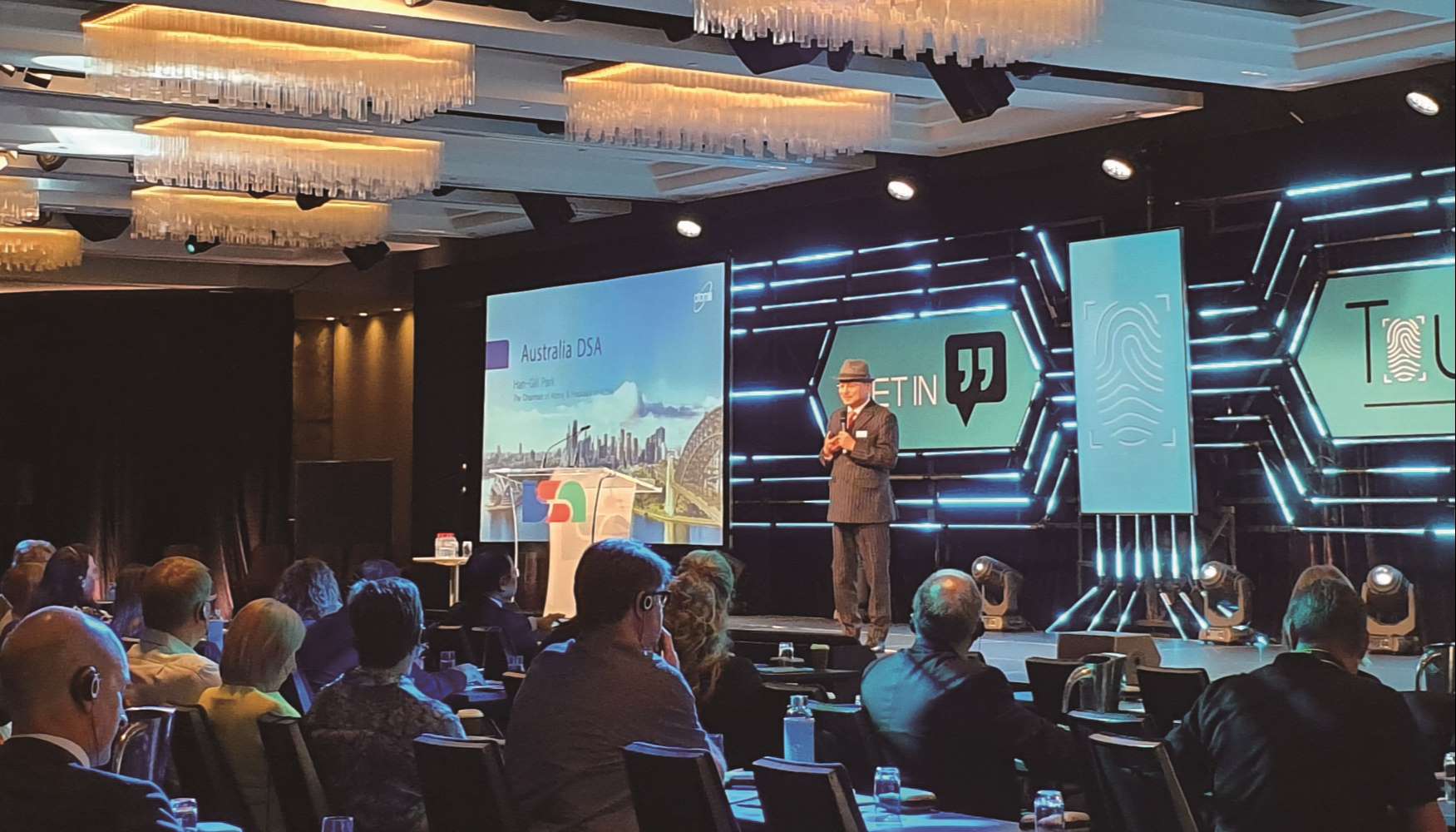
1. A meeting room inside the Atomy Park. Chairman Han-Gill Park believes that innovation comes from free and creative ideas.
2. The meeting room made out of toilets and a bathtub is also Chairman Han-Gill Park’s idea
3. The Direct Selling Australia invited Chairman Han-Gill Park for a speech in June, 2019.
Growth into a Post-Platform Business
In January of this year, Chairman Han-Gill Park attended a symposium held in Beijing regarding, ‘The Korean and Chinese regulation of the direct selling and social business industry.’ As always, he did not hesitate to share his insights. Park stated that, “Atomy was and is able to continue its growth because it was faithful to the fundamentals of direct selling,” and continued on to say, “Direct selling is a ‘platform’ that connects appropriate manufacturers to countless consumers and the gains must be shared with everyone in order for it to survive.” The world is currently captivated by platform businesses such as Amazon, Alibaba, Uber and Airbnb. The key point of a platform is connection and the connection between the manufacturers and consumers gives an enormous return to the platform. The limitation here is that this profit is not fairly shared with the participants of this platform and excessive number of sellers can also cause confusion for the consumers.
This is why the founder of Atomy strongly suggests that, “Direct selling must exceed the platform to truly become a big business.” If the competitiveness of the products is tended to and the connection of the industry is fortified, then values that surpass the platform businesses’ can be created. Chairman Park says, “Direct selling has to be something beyond that shares the values with all participants, a system that the members can even own themselves. This would be the ‘Post-Platform Business.’”
Atomy has already accomplished the concept of post-platform business. Not only has it secured product competitiveness, but its values are shared among the con-sumers, members and even the partnering companies. For example, the partnering companies of Atomy can invest in a long-term R&D to improve product quality as stable sales route is secured through the network which in turn leads to the availability of better quality products at lower prices for the consumers.
Atomy’s best seller product HemoHIM is the example of the company’s effort to minimize the operating costs. It is a health functional product that helps reinforce the immune system. HemoHIM raised a ₩9 billion ($7.4M) sales in 2009 which exceeded ₩100 billion ($83M) in 2014. In 2019, the number had reached about ₩200 bil-lion ($170M) achieving a ₩1 trillion ($900M) in cumulative sales. One of the factors behind the explosive growth was the significant reduction of price. When HemoHIM was first developed, it was priced at ₩770,000 ($630) but ever since Atomy became its distributor the price has been lowered to ₩84,000 ($70) by astonishing cost reduction.
The first of the Atomy’s founding principles is ‘con-tinuity.’ Prior to the current success, Chairman Han-Gill Park founded the online shopping mall, ‘imkorea. com,’ and failed after 3 years. Since then, Chairman Park came to believe that the first obligation of a company is to survive, and the best way to do so was to minimize the expenses. As a result, Atomy operates at a cost less than half of its competitors.
According to the 2018 audit report, the operating cost of Atomy was calculated to be 10.29%. If you exclude the card fee and logistics, the actual operating cost would only be about 6%. This is a dramatic difference between the average of 25.32% for the top 10 companies in the industry and the 20% excluding the fees.
When others only had a sales cost of 28.8% in average, Atomy had a significantly higher ratio of 44.9%
According to the reports of the Korea Fair Trade Commission, Atomy’s return rate in 2018 was 0.19%, a 1/16 of the average for the industry’s top 30 companies.
The ability of Atomy to reduce the costs so effectively can be found in the work philosophy of Chairman Park that, ‘work is eliminating the work itself.’ The way of work that Atomy pursues is well portrayed in the recently built headquarters, the Atomy Park. The concept of Atomy Park is an office in the playground, where rest, fun, and work are in harmony. Every day, the employees choose their desired location of work according to the free-seating policy. They may freely use the gym during work hours and different game equipment is situated throughout the building.
Chairman Park believed that, “In order to be good at what you do, you need to be immersed and focused. But in order to get rid of what you need to do, you need to be cre-ative. Implementing the amoeba organization system, getting rid of the titles and emphasizing the chutzpah mindset are all to form an environment to work creatively.”
In such ways, Atomy was able to lower unnecessary costs and raise sales costs, resulting in better quality and lower prices.
It does not simply overlook the product costs either. Since Atomy does not have any manufacturing facilities as a pure distributor, it needs to be supplied with higher quality and lower price products in order to stay ahead of the market. The vulnerability was resolved without oppressing the suppliers but rather supporting them. The manufactures that provide satisfactory quality and price would be guaranteed a stable profit through the ‘one partner per product’ policy, placing a supplier solely in charge of one product which in turn, promotes quality improvement. The payments are also made immediately once the inventory is delivered and no-interest loans are offered for purchasing of raw materials or quality improvements.
‘Atomy You Can Trust and Use’
Atomy has always stood by its management philosophy to become trustworthy in every aspect related to its consumers. Earning trust begins with the ‘Absolute Quality Absolute Price.’ The phrase ‘Absolute Quality Absolute Price’ has been the driving force of the brand since 2009.
“For Atomy to be trustworthy, absolute quality and absolute price is not enough,” says Han-Gill Park. “The consumers need to be able to trust and love the company itself not only the products. Atomy, therefore, does not stop at absolute quality and absolute price but continues on to spread the ‘Culture of Observing Principles,’ ‘Cul-ture of Growing Together,’ and the ‘Culture of Sharing.’”
The culture of observing principles states that the principles must be the grounds of every decision-making process. Atomy has declared that it needs to become a beneficial distributor to its consumers. This is the basis for the absolute quality and absolute price, the 100% refund guarantee, and taking on the role of a shopping curator.
The culture of growing together simply means what it states. The partners need to do well in order to continue supplying the products with absolute quality and price which leads to gaining trust from consumers. That trust is what pushes Atomy forward.
“Sharing is a calling for Atomy,” states Park. Ever since it opened its doors, this Korean direct selling com-pany has taken its social contribution roles seriously. Its recent donation of ₩10 billion ($8.3M) to the Community Chest of Korea was the largest amount for a mid-sized company to ever donate. This donor-advised funds will be used under the name ‘Life Cherishing Mom’ to support teenager single moms. Likewise, the culture of sharing is a must for Atomy and a way to help the society become a better place.
The consumers should also be able to depend on Atomy after making purchases. Any product sold by Atomy is guaranteed a return or an exchange whether it is due to a defect or simply a change of mind. Even used products are eligible for this refund because the belief that its consumers are always correct is at the center of Atomy. As a consumer-centered direct selling company, Atomy strives to prove beneficial to all consumers and their success. The efforts were acknowledged by the Fair Trade Commission when Atomy was accredited the CCM (Consumer Centered Management) certification as the first of the industry. Jai-Un Yu, the Chairman of Korea Special Sales Financial Cooperative Association, spoke of the matter that, “Many have tried to receive the CCM certificate but the negative perspective of the industry has hindered the way. Now that Atomy is clearing the path, I hope many more can continue on to receive this certification.” In such ways, Atomy is known to be advancing the direct selling industry as a whole.
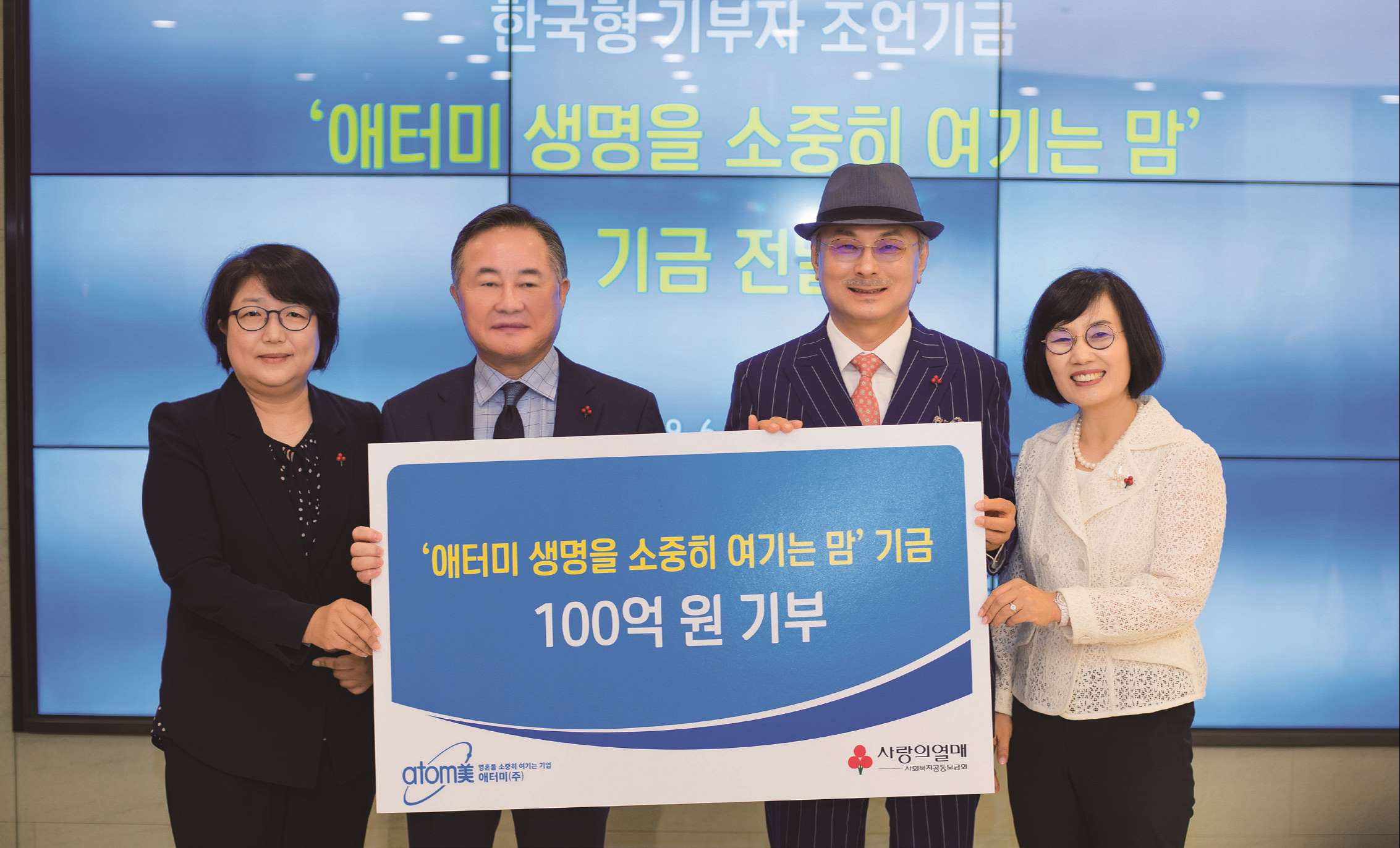
Atomy recently donated ₩10 billion to the Community Chest of Korea, making it the largest amount ever made by a mid-sized company.
Global Atomy is Just Getting Started
Atomy was noticed in the global community of di-rect selling since few years back. The Taiwan office, opened in 2014, became one of the top 5 in the local direct selling industry and is continuing its success. Chairman Han-Gill Park says that direct selling is a business that gives equal opportunities to everyone and allows a fair competition. The consumer-centered management has given Atomy its success.
Atomy has driven itself to become a global distrib-utor since the beginning. It has declared to become a global distribution hub, a hub which is at the center of every connection. For Atomy to become a distribu-tion hub means that it will connect the suppliers and consumers from all over the world. To approach such dreams, Atomy has done its best to become the shop-ping curator that provides absolute quality and price to save consumers from needless effort to find one.
Simply selling Korean products to the rest of the world is not enough to become a global distribution hub. Atomy needs to be able to support all consumers around the globe with absolute quality and price products. For this very reason, Atomy takes on the GSGS (Global Sourcing, Global Sales) strategy. Wherever Atomy has an office, the qualifiable products of the local market would be offered to the rest of the world. The sandwich laver and aroma patch from Taiwan, eye lutein and stockings from Japan, Kampot black pepper from Cambodia, avocado oil from Mexico, and so forth are introduced to the consumers else-where through Atomy.
Many great suppliers are given the chance to meet consumers through the platform called Atomy. Han-Gill Park states that, “Atomy dreams of the day when all consumers of the world perceive Atomy as a brand they can trust and use. Becoming ‘Atomy You Can Trust and Use’ means that the suppliers, consumers, and members all benefit from this direct selling, just another variation of distribution. Global Atomy is just getting started. It will not be unreasonable to believe that the past 10 years of success in Korea will repeat itself in the global market.”
